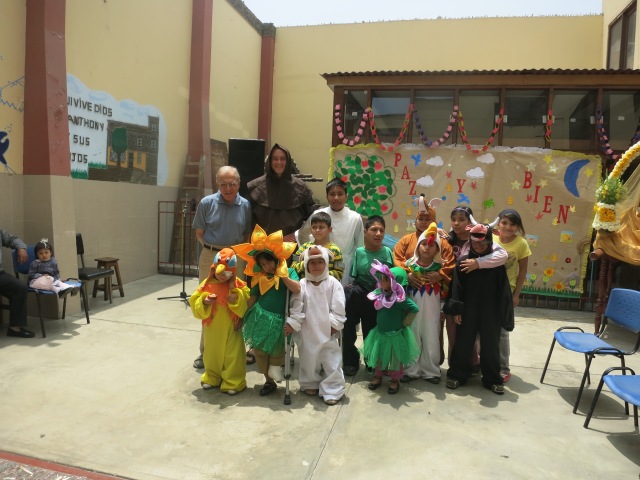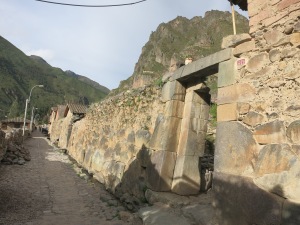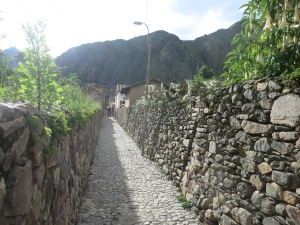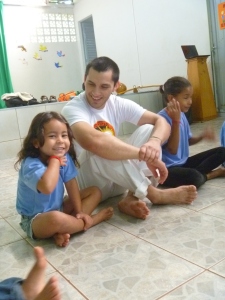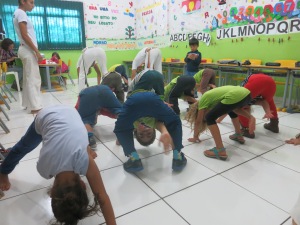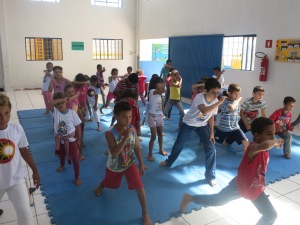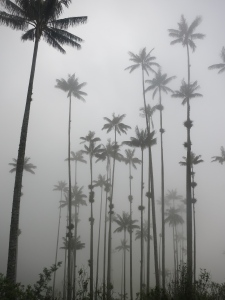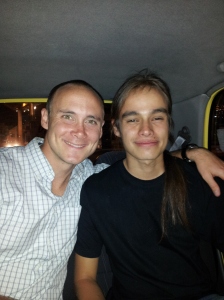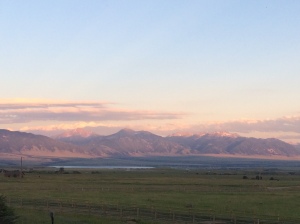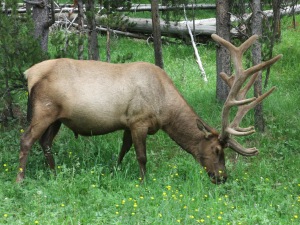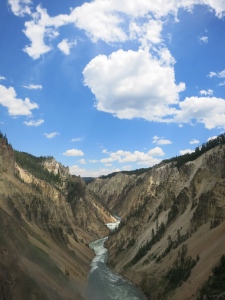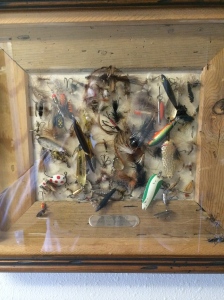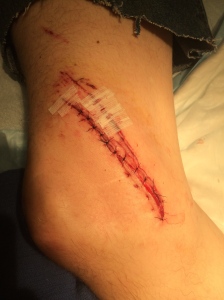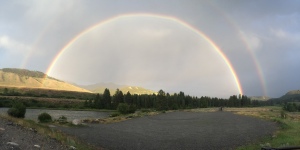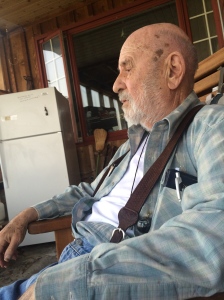
“Doc” Ron Losee
Doc Losee: Hello! I don’t know you.
Gregg Kennedy: Hi Doc Losee! I was here last week.
DL: Come in, come in. You were here last week? I don’t remember. So what! Jesus I’m glad you’re here.
GK: Have you had the trains going?
DL: WHAT?!
GK: Have you been running the trains here in the living room?
DL: You like model trains? These are Lionels.
GK: Yeah, they remind me of my Grandpa. He had a set he would put up every Christmas. I would put on my overalls and conductor hat and load the tiny milk bottles or miniature barrels and run the laden cars through the tunnels.
DL: Good. Hmmm. Yes. … You want some booze? Come here come here. This way. You can have whatever you like. Gin, whiskey. Take what you want.
GK: Naw, I need to eat dinner. I’m good.
DL: Dinner! No no no. I don’t like to drink alone. Get yourself some booze. Here. What do you want? Take a bottle. I don’t care. Whatever you like.
GK: Well, that whiskey…Hennesey? I’ll try that.
DL: Hennesey. Ha! Good. Here here. Let me get you a good glass. I don’t think we have any ice.
GK: That’s ok.
DL: I am so GOD DAMN glad you’re here. So GOD DAMN happy.
GK: Hahaha, me too Doc Losee.
DL: Here, let’s go to the porch. Get yourself a seat. That one. That’s a good one. Good good.
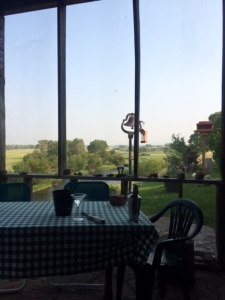
GK: This is beautiful. Woooow. The view of the Madison Range, the river running below. Man.
DL: Best place on Earth. So what! … Now listen here. You can go wherever you what to go and do whatever you want to do. Anywhere! Doesn’t matter. Ok?
GK: Ok.
DL: Now wait a minute. You’re a medical student.
GK: Yep.
DL: At Tulane.
GK: Yep.
DL: Nothing wrong with that. Nothing wrong with that.
GK: Nope. I love it there.
DL: It’s a great school. Now wait a minute, wait a minute. What do you want to do?
GK: I’m interested in pediatrics.
DL: Pediatrics! That’s great. Pediatrics. Why pediatrics? You like kids.
GK: Yeah, I like kids. They have this energy, this infectious life, a way of bouncing back from everything.
DL: Now wait a minute, wait a minute. Let me think. I like that. Energy. Infectious life. Yeah, I can see that. … Where do you want to go?
GK: I’m not sure yet. I’m kind of thinking about Denver.
DL: Denver. Denver General?
GK: Well, it would be the Children’s Hospital.
DL: Oh. Denver’s a good place. I trained at Denver General Hospital.
GK: Did you like it?
DL: I was there for residency. After the war. It was a big place. Right there downtown. Olive and I took the streetcar there. Not much to look at. I liked Montreal better.
GK: Montreal? What did you do there?
DL: Orthopedics. You know, I was a pretty good surgeon. I liked orthopedics. It made sense to me. I was too simple minded for general practice– too hard.
GK: Hahaha. You know, orthopods still have that reputation.
DL: Well, that’s how it is. I wasn’t smart enough for general practice. Orthopedics was simpler for me. So what!
GK: Yeah, I heard you developed one of the first ACL repairs. The Losee procedure.
DL: The Losee procedure. Ha! I figured out the trick knee, you know. The pivot shift. They took me to France to talk about it. France! <gibberish in French>
GK: You speak French?
DL: <French french french>
GK: Where in France did you go?
DL: Bordeaux. It’s in the south. Beautiful beautiful. … And the Swedes. They came all the way to Ennis, Montana to let me talk to them about it. Ennis, Montana! You can do whatever you want to do wherever you want to do it.
GK: How did you end up in Ennis?
DL: It’s the best place on Earth. Look at it! Nothing better. Yes. I went west in my Jeep– an old Army model, have you seen it? Me and Olive. We went west and found Ennis. Let me tell you. Live where you want to live.
GK: Yeah. I like that.
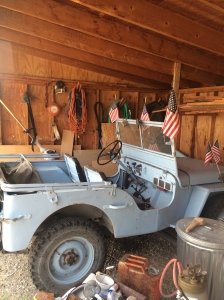
DL: Now wait a minute, wait a minute. You’re a medical student.
GK: Yep.
DL: Well. What’s your name?
GK: Gregg Kennedy.
DL: Dr. Kennedy. Let me be the first to call you doctor.
GK: Whoa, whoa, whoa. I’m not a doctor yet. I have one more year.
DL: No. No. You’re a doctor. You’re in school, aren’t you? You’re a doctor. Dr. Kennedy. I’m the first one to call you doctor, aren’t I?
GK: Yes. You are.
DL: Well you’re going to be a damn good doctor. A damn good one. It’s the best thing in the world. I am so GOD DAMN glad I was a doctor. Jesus I’m glad I was a doctor. Nothing better. You like being a doctor?
GK: I think so. So far.
DL: Now wait a minute. Wait a minute. You sound skeptical.
GK: No no no. I am glad. I can’t imagine doing anything else.
DL: Why did you decide to be a doctor? You always knew.
GK: Nooo. I actually decided late. When I was 21.
DL: Why?
GK: Well, I knew I liked people– hearing their stories, meeting new people, learning about their lives and thus learning about myself. But it wasn’t until I took an anatomy course my junior year that I realized how beautiful the human body is, how everything works perfectly yet how much mystery there still is. I knew I would never get bored studying it
DL: Now wait a minute. Let me think. I like that. Ha! That’s great. You’ll never get bored. I agree. … The human body. It’s complicated. That’s why I liked orthopedics. You know I was a surgeon? I went to Montreal and trained in Canada. Never be afraid to change your mind. Do what you want to do. You can always change your mind. You know, I went to Yale. So what! I tell everyone. It’s the boys in Nebraska and Kansas who get the best training. I’m right, you know.
GK: Kansas and Nebraska, huh?
DL: Kansas and Nebraska. The boys in Kansas and Nebraska are trained better. I’m right. At least I think I’m right.
GK: I think you’re right. Have you ever heard of the big fish in the little pond theory?
DL: Now wait a minute. Wait a minute. Let me think. The big fish in the little pond.
GK: Yeah. The big fish in the little pond or the little fish in the big pond.
DL: Hmmm. Now wait a minute. I don’t know about that. Let me think. Oh, my mind doesn’t work like it used to. You might be right.
GK: Sure! The Nebraska and Kansas boys are the big fish in the little pond.
DL: Ok ok. You might be right. You probably are. I just can’t think anymore. …. Wait a minute. You’re at Tulane. One more year to go? You want to do pediatrics.
GK: Yep.
DL: Nothing wrong with that. Why pediatrics?
GK: Uh, well. The kids keep me young and I have a profound respect for mothers.
DL: That’s good. … I am so GOD DAMN happy you’re here. You know that? … Do you know Hervormde Kerk?
GK: No.
DL: Ah so what! It’s the Dutch Reform church. What does that mean. It doesn’t mean anything. It’s not important. Upper Red Hook. That’s where I grew up. I learned at the age of twelve the golden rule: do unto others. That’s where I first learned an appreciation for the privilege of life. That’s doctoring. It’s the best way I can show my appreciation for the privilege of living. And I am so glad I was a doctor. SO glad! It’s the best profession in the world. … You know what my God is? Love. That’s all there is. The rest is just bullshit. Sorry.
GK: No no. That’s ok.
DL: What’s your God?
GK: Well, that’s tough.
DL: No it isn’t. There’s one: love. I think I’m right about that. Love. The golden rule. You know what I call the Virgin Mary?
GK: No.
DL: Mrs. Joseph Christ. Ha! I just can’t stand being lied to. If you lie to me everything else goes out the window. Honesty. Impecable honesty. That’s what we need. Love and impecable honesty. There’s nothing else. The only noble pursuits. My first God is love. Love one another. Do unto others.
GK: I can’t argue with that.
DL: I think I’m right. … GOD DAMN I am so happy you’re here. Are you happy?
GK: Yes sir!
DL: Do you want some more booze?
GK: No no. I’m good.
DL: …. Now wait a minute. You have one more year left. You’re at Tulane. You’re going to be a pediatrician.
GK: Yep.
DL: Why did you want to be a doctor?
GK: Wonder and awe.
DL: Now wait a minute. Wonder and awe. Let me think. That’s kind of vague. I don’t know about that. Hmm. I’m not smart enough for that.
GK: Hahaha. No, I just think that when I hear other people’s stories I can learn more about myself. I think the human body is something that I can study for the rest of my life and never get bored.
DL: Huh huh. Ok. Yes. I agree with that.
GK: It is beautiful here. Do you like to fish?
DL: No no. Do you? You can fish right here. Right now. You want to fish?
GK: No no no no no. You ever hike up in those mountains?
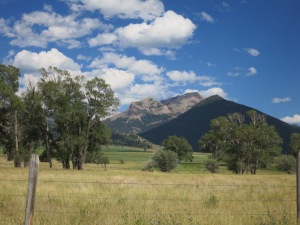
DL: Hike in the mountains? No no.
GK: No?!
DL: Well, yes. Maybe. I don’t know. I don’t think so.
GK: Well, you have a beautiful view here. Sphinx mountain. The Madison Range. The west fork of the Madison River. Wow.
DL: Mmmhmmm. Yes. Live where you want to live. That’s what I did. Where do you want to go?
GK: I’m not sure yet. Probably Denver if I can.
DL: Denver. In pediatrics? You have one more year?
GK: Yep yep!
DL: Nothing wrong with that. Are you glad you’re a doctor?
GK: So glad.
DL: Nothing better. Now tell me more about yourself. I want to hear about you. That was so GOD DAMN nice of you to come out to see me. So awfully nice.
GK: I grew up in St. Louis. I have a twin brother. He’s a neuroscientist that plays with monkeys and makes prosthetics controlled by brain waves.
DL: Ha! Plays with monkeys. That’s great.
GK: Yeah. I have a sister and a younger brother, too.
DL: Great! What do they do.
GK: My sister just got back from Africa and is in Indianapolis studying nursing and my little brother is in college still and is studying abroad in Germany.
DL: Wow! That’s great. Are you married? That’s none of my business.
GK: Hahaha. No Doc. Unattached. I can go anywhere and do whatever I want to do. My twin has that covered. He’s married and is expecting a little girl. I’m off the hook.
DL: Well that’s ok. You’ll find someone. Or you won’t. It doesn’t matter. … I’m so glad you’re here.
GK: Thanks Doc. I’m glad I’m here too.
DL: Now did you get a copy of my book?
GK: Already read it.
DL: You did? Well it’s not any good. But it’s honest.
GK: That’s all we can ask for.
DL: Impecable honesty. That’s what I believe in. And love. The golden rule: do unto others.
GK: I like that. … Well, Doc, I think I have to go.
DL: You’re leaving?
GK: Yeah, I need to get some food.
DL: Well, there’s food in the kitchen. Help yourself. I don’t know what we have.
GK: No no no no. I have food at my house waiting for me.
DL: At your house? Oh. Ok.
GK: But thanks for letting me come by and chatting with me. Walk me to the door?
DL: Of course, of course. Go slow. It was awfully nice of you to come out and see me. Awfully nice.
GK: I had a good time.
DL: Dr. Kennedy. I’m the first to call you doctor.
GK: You are.
DL: Well it’s the best thing that will ever happen to you.
GK: Thanks Dr. Losee.
DL: I am so happy you came by.
GK: Me too. Don’t worry, I’ll be back to see you again.
DL: Ok. Drive safe. And remember, go where you want to go and do what you want to do.
GK: Got it.
DL: And you can always change your mind. Don’t be afraid to do that.
GK: Yes sir. Thanks again, Doc.
DL: You bet. Any time. My house is your house.
GK: Of course.
DL: So nice. So nice. Ha! Awfully nice of him to come out. Awfully nice.
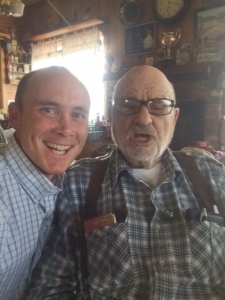
When I asked Doc to take a picture with me, instead of saying “cheese”, he said “BULLLLL” and we finished together “SHIT!”
Dr. Ron Losee was the first doctor to serve the town of Ennis, Montana. He arrived in 1949 fresh out of residency, taking his jeep from New York and going west with his wife and daughter. He practiced family medicine until the mid 1970s and has numerous stories of delivering babies, serving the ranchers, staying up all night, and loving life which he humorously and honestly documents in his book “DOC”. At the age of 37 he went back to residency to train in orthopedics and was one of the first to diagnose and treat the “trick knee”: the knee that would give out due to a torn ACL (it was previously taught that the MCL was the most important knee ligament and there was no treatment for the trick knee). In the 1970s he switched to orthopedics full time and wrote a pioneering paper on the diagnosis and repair of the torn ACL. He made several presentations both in the states and abroad as athletes and others traveled to small town Montana to see the knee specialist. It is difficult to over emphasize the importance of this man in the community. He can be ornery and opinionated in his old age but his sacrifice is a testament to how much he cared about his patients and to a type of doctoring that we will probably never see again. It was a privilege for me to get to visit him several times during my stay in Ennis. I wish I could have spent more time with him. I will echo what he learned from one of his heroes in medicine and has passed along in his book about life, medicine, and the people you meet along the way: it makes you humble, it makes you humble.

